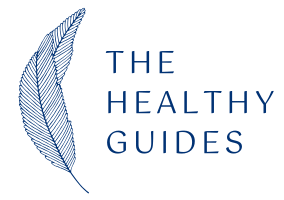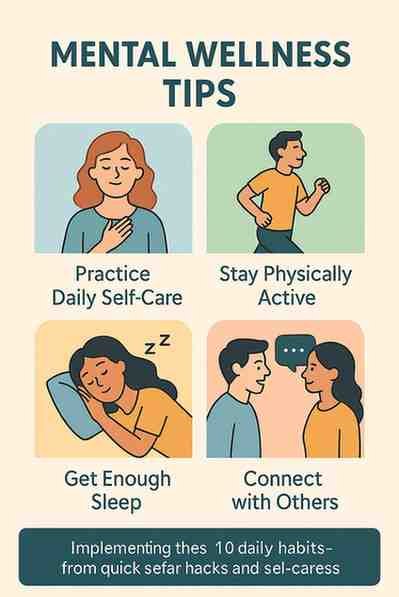10 Daily Habits for Better Mental Health and Less Anxiety
Maintaining good mental health is essential for overall well-being, yet many people overlook it in the hustle and bustle of daily life. mental wellness tips can help guide how we think, feel, and behave, influencing our relationships, productivity, and overall quality of life. Small daily habits, based on these tips, can significantly reduce anxiety, improve mood, and increase resilience, helping us better cope with stress and life challenges. By integrating these habits into your routine, you can cultivate a healthier mind, prevent burnout, and enhance emotional stability. This expanded article provides detailed guidance, practical examples, and actionable mental wellness tips for each habit to help you achieve long-term mental wellness.
1. Simple Self-Care Tips for When You’re Feeling Overwhelmed
Self-care is vital for maintaining balance, especially during stressful periods. It helps prevent burnout and improves emotional resilience.
Examples of Daily Self-Care
- Short Breaks: Take micro-breaks throughout the day to refresh your mind. For example, stretch, walk around your home, or drink water.
- Mindful Breathing: Practice deep breaths for 5-10 minutes to calm your nervous system and reduce cortisol levels.
- Leisure Activities: Engage in hobbies or activities that bring joy, such as reading, drawing, or gardening.
- Digital Detox: Limit social media or screen time to prevent mental fatigue.
- Sleep Hygiene: Ensure a consistent sleep schedule and a restful environment.
Additional Tips
- Schedule a weekly self-care ritual: Dedicate time for activities that recharge you, such as a spa day at home, a long nature walk, or a favorite hobby. Consistency helps reinforce mental wellness.
- Keep a self-care journal: Track which activities make you feel calmer, happier, or more energized. Reflecting on these entries can guide your daily choices and improve overall well-being.
- Set healthy boundaries: Communicate limits with work, friends, or family when needed. Protecting your time and energy is a key part of self-care and one of the most effective mental wellness tips for reducing stress.
2. How to Improve Your Mental Health Naturally: A Beginner’s Guide
Natural approaches to mental health focus on lifestyle habits and environmental adjustments rather than medications alone.
Beginner-Friendly Steps
- Exercise Regularly: Activities like walking, swimming, or yoga can boost mood and reduce anxiety.
- Sunlight Exposure: Spend 15-30 minutes outside daily to improve vitamin D levels.
- Mindfulness Practice: Start with guided meditations, progressive muscle relaxation, or mindful observation.
- Journaling: Write down thoughts and emotions to process feelings and track progress.
- Healthy Diet: Consume nutrient-rich foods that support brain function, like leafy greens and fatty fish.
Benefits
- Increased energy and emotional resilience.
- Reduction in stress, anxiety, and depressive symptoms.
- Improved focus, memory, and problem-solving ability.
- Enhanced overall quality of life.
3. Powerful Morning Routines to Reduce Stress and Boost Mood
The way you start your day influences your mental state throughout the day. A structured morning routine can help reduce stress and promote positivity.
Morning Routine Tips
- Consistent Wake Time: Wake up at the same time every day to regulate your body clock.
- Exercise: Engage in light movement like yoga, stretching, or a short walk.
- Gratitude Practice: List three things you are grateful for to start your day with positivity.
- Healthy Breakfast: Include protein, whole grains, and fruits to energize your mind and body.
- Mindful Moments: Spend a few minutes meditating or setting intentions for the day.
Benefits
- Reduces morning anxiety and sets a calm tone.
- Improves focus, energy, and productivity.
- Encourages emotional regulation and positive thinking.
4. Mental Health Tips for Busy People: Easy 5-Minute Hacks
Even with a busy schedule, incorporating small mental health practices can have a big impact.
Quick Habits
- Deep Breathing: Take 5 minutes to do slow, focused breathing.
- Mini Walks: Step outside for a few minutes to clear your mind.
- Calm Music: Listen to relaxing music to lower stress hormones.
- Positive Affirmations: Repeat encouraging statements to counter negative thoughts.
- Stretching: Quick stretches reduce physical tension and improve mental clarity.
Benefits
- Rapid stress relief during hectic days.
- Improved emotional regulation and focus.
- Sustainable habits that accumulate over time for long-term mental health.
5. How to Stop Negative Thoughts: 10 Cognitive Behavioral Tips
Cognitive Behavioral Therapy (CBT) techniques are effective for managing negative thought patterns and promoting healthier thinking.
CBT Strategies
- Identify Negative Thoughts: Recognize patterns that trigger stress or anxiety.
- Challenge Irrational Beliefs: Ask yourself for evidence supporting negative thoughts.
- Reframe Thoughts: Replace negative thoughts with balanced alternatives.
- Mindfulness Observation: Observe thoughts without judgment.
- Behavioral Experiments: Test assumptions to reduce fear or anxiety.
- Thought Journaling: Record triggers and emotional responses.
- Cognitive Restructuring: Gradually adjust thought patterns over time.
- Exposure Therapy: Safely confront fears to reduce avoidance behavior.
- Problem-Solving Skills: Break challenges into manageable steps.
- Reward Positive Changes: Acknowledge and reinforce healthy thought patterns.
Benefits
- Reduced frequency and intensity of negative thoughts: Practicing effective strategies can help you notice and manage harmful thinking patterns before they take over.
- Enhanced emotional resilience and self-awareness: Consistent mindfulness and reflection improve your ability to respond to challenges calmly and thoughtfully.
- Better stress and anxiety management: Implementing these mental wellness tips equips you with tools to cope more effectively with daily pressures and emotional triggers.
6. Building a Personal Self-Care Routine for Emotional Wellness
A well-structured self-care routine ensures consistent attention to emotional and mental well-being.
Routine Elements
- Daily Reflection: Spend 10-15 minutes journaling or meditating.
- Physical Activity: Incorporate activities that you enjoy for physical and mental health.
- Relaxation Time: Dedicate time for hobbies or leisure activities.
- Sleep Schedule: Maintain consistent sleep to support mental and physical health.
- Social Interaction: Connect with friends or family regularly.
Tips for Success
- Start small and gradually build up your routine.
- Adjust based on mood and energy levels.
- Celebrate milestones and progress to reinforce positive habits and mental wellness tips.
7. Affordable Ways to Improve Your Mental Health Without Therapy
Supporting mental health doesn’t always require professional therapy. There are numerous low-cost or free options available.
Cost-Effective Strategies
- Meditation Apps: Insight Timer, Smiling Mind, or Calm offer free options.
- Peer Support Groups: Join online forums or local community groups.
- Books and Podcasts: Learn coping strategies and self-help tips.
- Nature Exposure: Walking or spending time outdoors boosts mood and reduces stress.
- Mindful Practices: Daily mindfulness or journaling exercises.
Benefits
- Accessible mental health support without financial strain.
- Reduction of anxiety and stress through self-guided practices.
- Promotes emotional resilience and self-awareness.
8. Mental Wellness Tips for Students Dealing with Burnout
Students often experience academic pressure, social challenges, and uncertainty, which can impact mental health.
Coping Tips
- Balanced Study Schedule: Avoid overloading and allow time for rest.
- Scheduled Breaks: Short breaks increase focus and prevent fatigue.
- Sleep Hygiene: Prioritize consistent and adequate sleep.
- Peer Support: Discuss stressors with classmates or mentors.
- Mindful Study Techniques: Use active recall, spaced repetition, and focus exercises.
Benefits
- Reduced academic stress and anxiety.
- Improved concentration, learning efficiency, and overall performance.
- Enhanced long-term emotional resilience.
9. Lifestyle Changes for Long-Term Mental Health Improvement
Sustainable lifestyle changes create lasting mental wellness beyond short-term interventions.
Key Lifestyle Changes
- Balanced Diet: Include omega-3s, antioxidants, and whole grains for brain health.
- Regular Exercise: Consistent activity improves mood and cognitive function.
- Limit Alcohol and Caffeine: Excess intake can disrupt sleep and elevate anxiety.
- Mindful Technology Use: Set boundaries on screen time and social media.
- Hydration: Drink adequate water to support cognitive and emotional health.
Benefits
- Improved emotional stability and cognitive performance.
- Lowered risk of depression, anxiety, and chronic stress.
- Overall enhancement in quality of life and daily functioning.
10. Incorporate Mindfulness and Self-Compassion
Mindfulness and self-compassion promote long-term emotional resilience and reduce stress.
Tips for Mindfulness and Self-Compassion
- Daily Meditation: Spend 10-15 minutes practicing focused attention.
- Positive Self-Talk: Speak kindly to yourself, avoiding harsh criticism.
- Celebrate Achievements: Acknowledge progress and small successes.
- Body Scan Exercises: Increase awareness of emotional and physical states.
- Mindful Walking or Eating: Engage fully with each moment to reduce anxiety.
Benefits
- Lower stress and anxiety levels.
- Improved emotional regulation and self-awareness.
- Strengthened relationship with oneself, enhancing overall mental wellness.
Conclusion
Implementing these 10 daily habits—from quick self-care hacks and CBT techniques to lifestyle changes and mindfulness practices—can significantly enhance your well-being. These practical mental wellness tips help reduce anxiety, boost emotional resilience, and improve overall mood. With consistent practice, patience, and self-compassion, gradually incorporating these strategies into your daily routine can lead to long-term mental wellness, a more balanced life, and greater emotional stability.
FAQs: 10 Tips to Improve Mental Health
Q1: What is the single most important thing I can do for my mental health?
A: While mental health is complex, many experts agree that prioritizing sleep is foundational. Consistent, quality sleep regulates emotions, improves cognitive function, and reduces stress. Without adequate sleep, it becomes significantly harder to implement other positive habits like exercise or healthy eating. Think of sleep as the bedrock upon which all other mental wellness strategies are built.
Q2: How can I improve my mental health naturally without medication?
A: Many natural strategies can significantly boost mental wellness. Key approaches include:
- Regular Exercise: Even a daily 20-minute walk releases endorphins, which act as natural mood lifters.
- Mindfulness and Meditation: Practices like deep breathing or meditation can calm the nervous system and reduce anxiety.
- Nutrient-Rich Diet: Foods rich in omega-3s (like salmon), and vitamins B and D support brain health.
- Sunlight Exposure: Just 15 minutes of sunlight can boost Vitamin D and serotonin levels, improving mood.
- Social Connection: Meaningful interactions with friends or family are a powerful buffer against stress.
Q3: What are some quick coping skills for anxiety?
A: For immediate relief during moments of high anxiety, try these techniques:
- The 5-4-3-2-1 Grounding Technique: Identify 5 things you can see, 4 things you can feel, 3 things you can hear, 2 things you can smell, and 1 thing you can taste. This forces your brain to focus on the present.
- Deep Belly Breathing: Inhale slowly for 4 seconds, hold for 4 seconds, and exhale for 6 seconds. This activates the body’s relaxation response.
- Temperature Change: Splash cold water on your face or hold an ice cube. The shock can interrupt the anxiety cycle.
Q4: How does physical health affect mental health?
A: The mind and body are deeply interconnected. Physical health directly impacts mental health through:
- Neurochemistry: Exercise releases “feel-good” chemicals like endorphins and serotonin.
- Inflammation: A poor diet can increase inflammation, which is linked to depression.
- Energy Levels: Poor physical health leads to fatigue, which worsens mood and motivation.
- Self-Esteem: Taking care of your body can improve self-perception and confidence.
Q5: What are the signs that I might need professional help for my mental health?
A: It’s advisable to seek professional help (like a therapist or doctor) when your mental state:
- Consistently interferes with your work, school, or relationships.
- Causes significant distress for more than two weeks.
- Leads to thoughts of harming yourself or others.
- Makes it difficult to get through daily responsibilities.
Remember, seeking help is a sign of strength and self-awareness, not weakness.
Q6: How can I stop negative thinking patterns?
A: To break the cycle of negative thinking, try:
- Cognitive Reframing: Challenge the negative thought. Ask yourself, “Is this thought 100% true? What’s a more balanced way to see this situation?”
- Scheduled Worry Time: Postpone your worrying to a specific 15-minute window each day. This contains the rumination.
- Practice Gratitude: Keep a daily journal and write down three things you are grateful for. This shifts your brain’s focus to the positive.
Q7: What is a simple self-care routine for beginners?
A: A simple, sustainable self-care routine doesn’t need to be complicated. Start with the “Big Three”:
- Move Your Body: 10-15 minutes of stretching or walking.
- Hydrate and Nourish: Drink a large glass of water and eat a balanced meal.
- Connect or Unplug: Spend 5 minutes talking to a loved one OR spend 5 minutes in silence without your phone.
Consistency with small actions is far more important than occasional grand gestures.
Q8: Why is social connection important for mental health?
A: Humans are social beings. Strong social connections:
- Reduce feelings of loneliness and isolation.
- Provide emotional support during tough times.
- Boost feelings of belonging and purpose.
- Can literally lower levels of the stress hormone cortisol. Even small, positive interactions can make a significant difference.
If you’re looking for more structured approaches, check out our Diet Plans section for meal guides tailored to weight loss, muscle gain, or balanced living.” - High protein breakfasts aren’t just good for your body—they also stabilize mood and energy, reducing anxiety crashes later in the day. Learn more in our Mental Health section.
- Did you know that what you eat in the morning can affect sleep quality at night? A balanced breakfast supports stable circadian rhythms—discover more in our Sleep Health articles.
- For more tips and support, visit our Facebook page.
- “Explore 10 proven daily habits for a healthier mind on [Trusted Source].”







